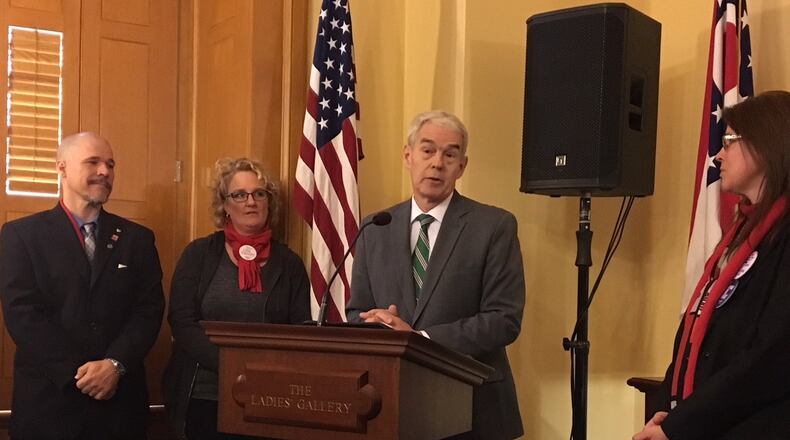The AAUP-WSU’s strike will end the week in its 19th day Saturday as a stalemate over health care benefits continues.
A group of democratic lawmakers has sent a letter to the Wright State board of trustees in support of the AAUP-WSU, Liston said. Wright State’s faculty and Ohio’s students “deserve better,” Liston said.
» RELATED: What will it take to end WSU strike? A court order could do it
“Without a strong commitment to higher education and those who make it possible we risk falling behind as a state,” Liston said
The AAUP-WSU and its supporters said they traveled to Columbus in an attempt to put pressure on Gov. Mike DeWine and his administration to step in to help negotiate a deal. DeWine and Ohio Higher Education Chancellor Randy Gardner have both been monitoring the ongoing labor dispute.
DeWine said earlier this week that he had no plans to take any action regarding the strike. On Thursday, he said it would be inappropriate to announce the options he may consider to address the strike.
Gardner stopped by the Statehouse gathering Friday and briefly spoke to faculty about the strike. Gardner told faculty that they are “a valuable and important part” of Ohio’s higher education system.
“When you have opportunities to try to bring people together to resolve issues, I still believe that’s fundamentally part of this job as chancellor,” Gardner said. “So we’re trying to do that.”
Though Gardner said “there’s nothing official to announce,” he expressed his hope that both sides would return to the negotiating table within the next few days. There were no negotiating sessions scheduled as of Friday afternoon, said Wright State spokesman Seth Bauguess.
Gardner also met with students to hear about how the strike has affected them. Friday was the deadline for students to withdraw from WSU and still receive a full refund.
» RELATED: Wright State board votes on new contract offer, faculty union calls it a ‘stunt’
Bauguess was unable to provide the number of students who had withdrawn as of Friday. But, the school previously reported the number of students who withdrew in the first two weeks of the semester was 181, comparable to 183 during the same time period last year.
Early Friday, students concluded a multi-day sit-in outside of President Cheryl Schrader’s office on campus. Some of those students spoke at the AAUP-WSU’s rally about the difficulties they’ve faced during the strike.
The issue of how the strike could impact veterans taking classes came up during the Statehouse gathering.
Veterans should not be impacted if they pick up new classes or “B-term” classes in place of their canceled ones, Bauguess said. The university will “ensure” no students experience a gap in their benefits if they pick up one of these alternate classes, Bauguess said.
Caitlin Ward, a Navy veteran and sophomore studying motion pictures, is paying for her education with benefits from the G.I. Bill. Ward said she fears her canceled and rescheduled courses could affect the funding she receives and may prevent her from getting a housing allowance she needs on time.
“The administration said that when the strike began that they would cover classes but they did not…I’m here today to spread the word that this administration does not care about our faculty and they do not care about our education or students,” Ward said.
FIVE FAST READS
• Easton to anchor expansion with new store in 2019
• WSU may face more scrutiny despite deal on federal visa investigation
• Heating costs could spike this winter as natural gas prices increase
• EXPERT: Wright-Patterson ‘crucial to avoiding a defeat if there’s a World War III,’
• What UD’s change in its China Institute says about shifts in higher education
About the Author
